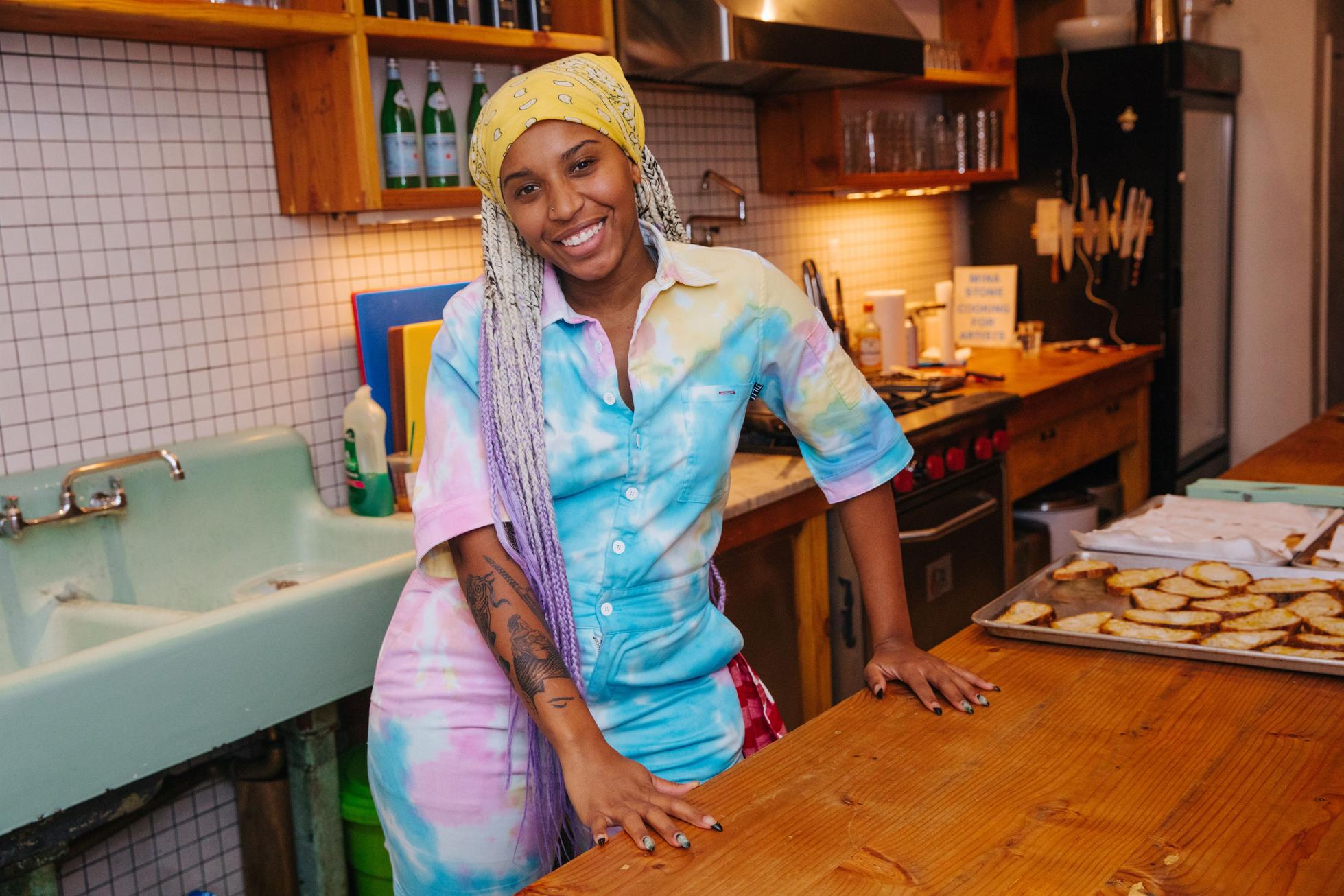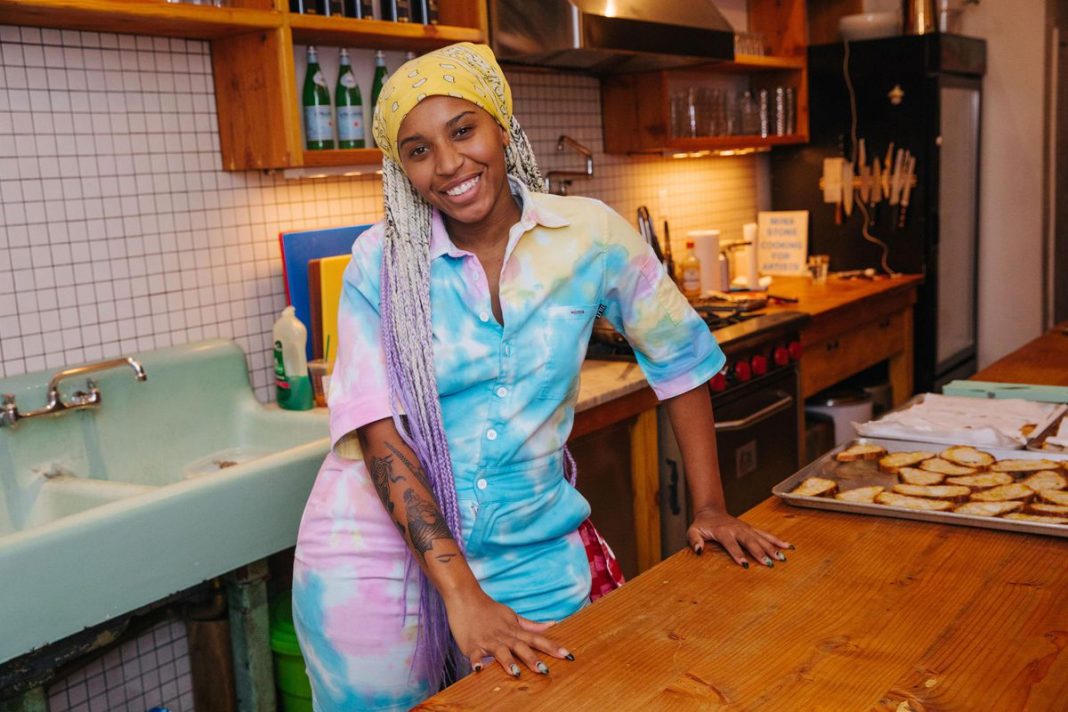
“I’m giving back to the communities that helped shape who I am,” says 30 Under 30 chef Kia Damon.
Kia Damon
Kia Damon is many things. She’s an advocate for the Black and LGBTQ+ communities, the first culinary director of feminist food publication Cherry Bombe and an entrepreneur. But first and foremost, she is her family’s chef.
Growing up in a big family in Orlando, Florida, Damon found herself in the kitchen at an early age. What she didn’t learn cooking alongside her grandmother, she learned from watching Bobby Flay and Iron Chef. By the time she was 11, her grandmother’s lessons in basting and Flay’s tutorials in maximalism had prepared her to become the cook of the house.
“I ended up doing a lot of cooking for my brothers,” says Damon, who appeared on Forbes 30 Under 30 Food & Drink list in 2021. “Then I was recruited to just cook for special events in the house: birthdays, anniversaries, Mother’s Day, Father’s Day.”
After graduating from Edgewater High School in 2012 and spending a few months at community college, she moved to New York to become a sous chef in Manhattan, her Southern roots in tow. Her signature Louisiana-style red beans and rice with Andouille sausage, topped with cornbread and Crystal hot sauce, helped to land her roles at kitchens in Manhattan, followed by a job as the executive chef at Chinatown’s buzzy Cali-Latin Lalito restaurant at just 24 years old.
Though Lalito branded itself as a laid-back alternative to the city’s highbrow culinary institutions—its bathrooms, for example, were not only gender neutral, but filled with jungle-meets-disco decor and Destiny’s Child’s “Survivor” and Jennifer Lopez’s “Waiting for Tonight” on loop—the kitchen culture was far from progressive, according to Damon. She says she was sexually harassed by a staffer and subjected to racism, homophobia and misogyny. Damon says she reported the sexual misconduct incident and it was addressed. Lalito’s former management declined Forbes’ request for comment.
In June 2019 she quit, and a few months later won an episode of Chopped, and with it a $10,000 cash prize. Since then, she’s been paying it forward to the Black and queer communities of New York. In August 2020, She founded Kia Feeds The People, a nonprofit that aims to provide Black Brooklynites with organic, hot meals and pantry supplies. “Living in Bed-Stuy, Brooklyn, a historically Black community, you see the effects of gentrification, food apartheid of red lining,” she says. “It’s really difficult to look at sometimes, so I wanted to make sure I took care of my community.” Simultaneously, she and Petra alumnus Zacarías González launched Auxilio, an intersectional food space that provides meals and events for the QTPOC community. “All involved are gay, lesbian, non-binary people,” Damon says. “The mission is to address hunger within the community, which is something we really don’t talk about even though I’ve experienced it myself.” Both are bootstrapped and based in Brooklyn.
During a visit back home to Florida, Damon called Forbes to discuss her introduction to cooking, how she’s addressing food inequality and her views on hospitality.
Forbes: How did you discover your love of cooking?
Kia Damon: When I cooked for my parents before they separated. It was an anniversary. I did these roasted Cornish hens stuffed with cherries and fresh green beans with fresh garlic, some creamy mashed potatoes with the skin on them stuffed with goat cheese. And I had made Oreo cupcakes from scratch. I was just having a good time, but honestly, I felt extremely liberated, really. I felt really liberated.
Forbes: So much of what you’re doing these days is giving. Why did you turn this into your life’s work?
Damon: My mom grew up with lots of siblings; they didn’t grow up with a lot of money. She also had me very young so she was very independent and had to figure things out. When I was younger, I definitely didn’t understand it. Later, I realized how cruel the world could actually be—how many systems are set up to make things truly difficult for us even before I started.
It really started to weigh on my mind and as I continued into food service and found myself in a place where a lot of the work that I was doing was very self-centered—based off of awards, accolades, notoriety and all of that. Hospitality is to serve other people and not just the people who are able to afford it, but the people who are homeless, and the people who are struggling with food insecurity and the people who can’t cover groceries or can’t afford delivery. Now that I’ve made this my life’s work, I’m the most alive I’ve ever felt.
Forbes: How do you get the word out to people that Kia Feeds the People and Auxilio exist?
Damon: We go to the top of the building and scream: ‘Please! Hello! Look at us!’ We cook, we do popups—we’ve been relying heavily on Instagram, which we’ve collectively decided is a very difficult way to reach people. Now we try to post-up at clinics to get the word out.
Hospitality is to serve other people and not just the people who are able to afford it.
Forbes: How did you discover your love of cooking? Was it a meal? A person? And how exactly did you decide to make your life’s work?
Damon: It was when I cooked for my parents before they separated. It was an anniversary. I did these roasted Cornish hens stuffed with cherries and fresh green beans with fresh garlic, some creamy mashed potatoes with the skin on them stuffed with goat cheese. And I had made Oreo cupcakes from scratch. I was just having a good time, but honestly I felt extremely liberated, really. I felt really liberated.
Forbes: I read an interview in which you said you’ve been the only Black woman in every kitchen you’ve worked in. How have those experiences shaped your entrepreneurial endeavors?
Damon: It sucked. It was so difficult, Jesus Christ. Everyone was so damn racist. If it wasn’t towards me as a Black woman, it was to other communities. There came a point where it was like, ‘Do I stomach this to keep my job, and make myself invisible while swimming in shark infested waters? Or do I make some noise at the expense over being severely harmed?’
The first week being at Lalito, I was sexually and physically harassed by one of the line cooks. I’m still in shock. I tried to shake his hand to introduce myself and he grabbed my hand and wouldn’t let go. I was like, ‘We’re good here.’
And he was like, ‘When are you going to let me take you out? Don’t touch me like that if you’re not going to let me have what I want.’
I was like, “Touch you like that? I shook your hand. I’m your boss. What are you talking about?” Then he started to get extremely aggressive and put his hands on me.
I was ready to quit restaurants and be a cook. I truly could not live feeling so unsafe—hyper visible yet so unseen. Now, with my own endeavors, I try to have conversations with Black women who’ve reached out. You can be a Black woman in food and maybe you don’t aspire to work in a restaurant, and that’s okay. There are other ways you can do this.
Forbes: How do you think food and cooking can promote racial equality?
Damon: Food helps people let down their walls. Cooking and eating were some of the earliest forms of shaping community. People have always bonded over food, but it’s the opposite when people hurt over food.
This interview has been condensed and edited for clarity.




